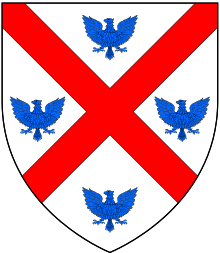Richard Hampden (died 1728)

Richard Hampden PC (aft. 1674 – 27 July 1728) of Great Hampden, near Wendover, Buckinghamshire was an English Whig politician who sat in the House of Commons almost continuously from 1701 to 1728.
Early life
[edit]
Hampden was the eldest son of John Hampden, and his first wife Sarah Foley, daughter of Thomas Foley of Witley Court, Worcestershire. He was great-grandson of Ship money tax protester John Hampden. His younger half-brother was John Hampden, MP. In 1696, he succeeded his father to the Wendover estate and Hampden House. His father committed suicide, which was agreed to be a "sad cloud" over the son: friends urged him not to react by "sowing his wild oats". He studied at Utrecht in 1699. In 1701, he married his first cousin Isabella Ellys, daughter of Sir William Ellys, 2nd Baronet, MP of Wyham and Nocton, Lincolnshire.[1]
Career
[edit]Hampden was returned unopposed as MP for Wendover at the two general elections of 1701, and was elected in contest in 1703 and 1705. At the 1708 general election, he was returned unopposed as MP for Buckinghamshire but was defeated in contests in 1710 and 1713. In 1710 he was offered a seat on the Treasury Commission but refused. He then quarreled with the Queen, urging her not to dissolve Parliament. Anne made the crushing retort that "though she had offered him employment she had not asked for his advice". He was returned as MP for Berwick-on-Tweed at a by-election on 22 December 1711 and at the 1713 general election.[1]
Hampden was returned unopposed as MP for Buckinghamshire again at the 1715 general election. In 1716 he was appointed Teller of the Exchequer. In 1718, he was sworn of the Privy Council and appointed Treasurer of the Navy. In 1719 he was one of the original backers of the Royal Academy of Music, establishing a London opera company which commissioned numerous works from Handel and others.[2] In 1720, he speculated in the stock of the South Sea Company using naval funds to make a personal profit. When the South Sea Bubble burst, he made losses of £90,000, of which less than half was secured. He was consequentially dismissed from office. In 1722 he was elected MP at Wendover and in 1727, he was returned unopposed at Wendover and elected without his knowledge at Buckinghamshire and chose to sit for the latter.[3]
Hampden died on 27 July 1728.
References
[edit]- ^ a b "HAMPDEN, Richard II (aft.1674-1728), of Great Hampden, nr. Wendover, Bucks". History of Parliament Online (1690-1715). Retrieved 29 September 2018.
- ^ Thomas McGeary. The Politics of Opera in Handel's Britain. Cambridge University Press, 2013. p.254
- ^ "HAMPDEN, Richard (aft.1674-1728), of Great Hampden, Bucks". History of Parliament Online (1715-1754). Retrieved 17 August 2018.
- 1670s births
- 1728 deaths
- Politicians from Buckinghamshire
- English MPs 1701
- English MPs 1701–1702
- English MPs 1702–1705
- English MPs 1705–1707
- Members of the Parliament of Great Britain for English constituencies
- British MPs 1707–1708
- British MPs 1708–1710
- British MPs 1710–1713
- British MPs 1713–1715
- British MPs 1715–1722
- British MPs 1722–1727
- British MPs 1727–1734
- Members of the Privy Council of Great Britain
